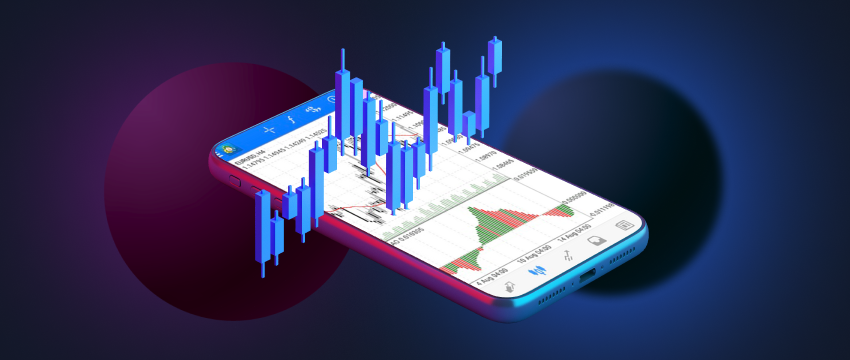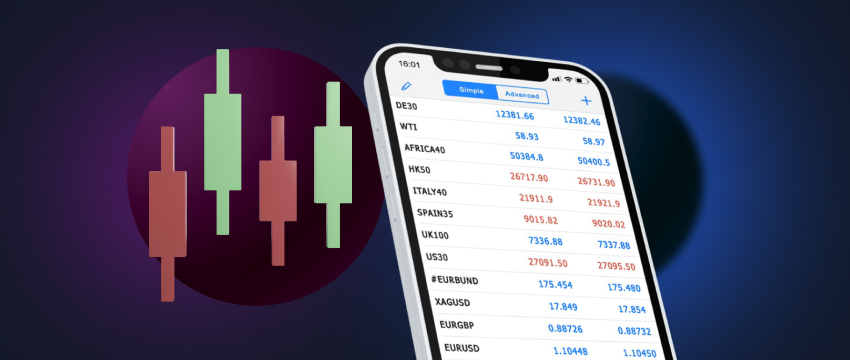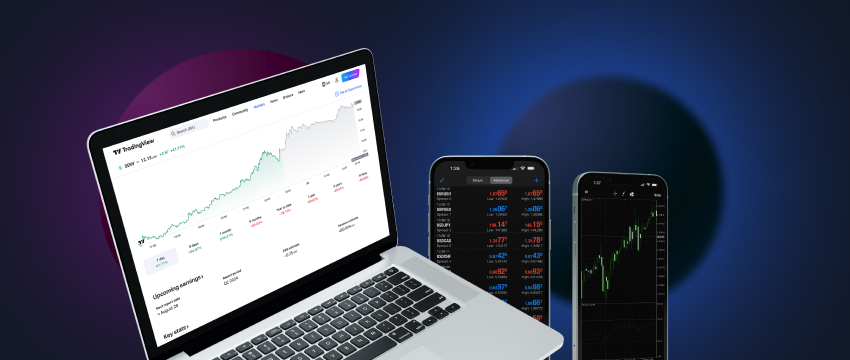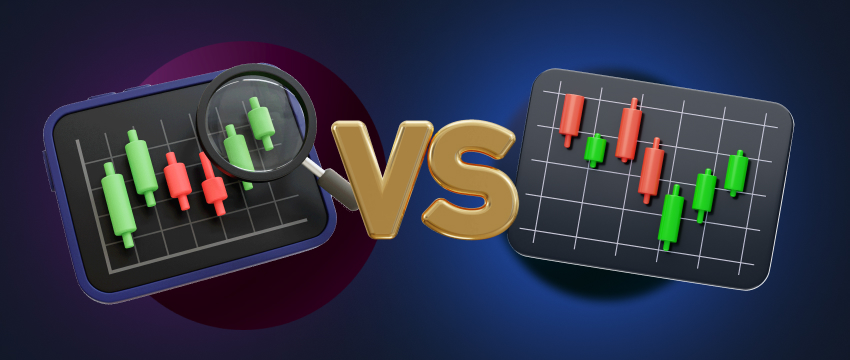The MetaTrader 4 (MT4) platform is popular for a variety of reasons. Not least of all is its algorithmic trading capabilities. It also offers cutting-edge analytics tools.
In comparison, TradingView is earning itself a name in the trading market. It stands out for its innovative price charts. TradingView also offers easy-to-read trading signals 택하고 기술적 지표.
However, which platform remains a firm favourite amongst global traders and why? In this blog, we’ll provide you with a MetaTrader 4 vs TradingView analysis. This will help you pick the right trading platform for you.

MetaTrader 4 (MT4)
MetaQuotes Software Corporation developed and released the MT4 platform in 2005. Designed primarily for forex trading, MetaTrader 4 has since become a powerful multi-asset platform. It allows for the 거래 of commodities, metals, stocks, indices, and futures, typically via contracts for difference (CFDs).
MetaTrader 4 is also incredibly flexible. It delivers a robust desktop experience, a streamlined web-based option, and a lightweight, easy-to-use mobile app for trading on the go, internet connectivity permitting.
Highly sought after, robust tools further enhance the platform. These include thousands of custom indicators (both free and paid), templates, and trading robots (Expert Advisors or EAs).
MT4 caters to all types of traders, from beginners to professionals. It supports scalpers, position traders, and those looking to automate the execution of their trades.
In fact, the MetaTrader 4 platform is well-known for its automated trading features. This includes what is commonly referred to as algorithmic or algo trading.
What is algo trading in MT4?
Algorithmic trading refers to the automation of trade execution. In other words, you use a computer program that follows a set of predefined instructions to place a trade. These instructions or rules are based on factors like price, timing, and quantity.
Automating trading in this manner has become increasingly widespread. This is because it eliminates the emotional element. The emotional element often leads to adverse outcomes.
Based on predefined instructions, the algorithmic trading system identifies trading opportunities and places buy and sell orders when those conditions are met. This way, traders no longer need to monitor live prices or graphs or manually execute trades.
This is not to say that vigilance isn’t vital—it absolutely is. However, algo trading certainly strips away the anxiety inherent to constantly monitoring the markets.
TradingView
According to their website, TradingView is a charting platform and social network used by 60M+ traders and investors across the globe to identify opportunities across global markets.
With 400+ indicators and smart drawing tools, TradingView offers comprehensive coverage of global stocks, currencies, and cryptocurrencies.
Using the exclusive Pine Script language, users can modify existing indicators or develop new ones from the ground up. The public script library hosts numerous scripts shared by fellow TradingView users.

Other key features include:
- 20 chart types: including Renko, Kagi and Point & Figure — all customizable.
- Up to 16 charts per tab: plus, synchronize symbols, timeframes and even drawings.
- Command search: complete any action in seconds with the global command search.
- Spreads: create your own custom formulas using math operations.
- Custom timeframes: any possible timeframe, including seconds and range bars.
(MT4) MetaTrader 4 vs TradingView
While both platforms have something to offer the trading community, there are some distinct differences that may make choosing between the two a little easier.
Let’s examine what some of those differences are.
- MT4 reportedly has over 50+ million trading accounts, while TradingView has around 50 million traders but fewer than a million trading accounts.
- MetaTrader 4 reportedly offers over 1,500 brokers, while TradingView currently supports fewer than 100, according to their help center.
- While both platforms offer a demo 거래 계좌, MT4’s is fully customisable. Furthermore, while both MetaTrader 4 and TradingView offer algorithmic trading, MT4’s has gained notoriety for being an industry leader as far as trade automation is concerned.
- MetaTrader supports the integration of MAM/PAMM modules for multi-account and traditional account management services, whereas TradingView does not.
- TradingView is recognized for its innovative chart design. However, manual traders who appreciate TradingView’s professional-looking charts often choose to place their orders on the MT4 trading platform.
- When it comes to user experience and interface, both platforms have their individual strengths. MT4, with its classic and robust design, may appear dated but remains highly functional and intuitive. TradingView on the other hand boasts a more modern and visually appealing interface, possibly making it attractive to new users.
- While TradingView operates on a freemium model, offering free access to basic features and charging for premium services, MT4 is generally provided for free by forex brokers to their clients.
- In terms of accessibility, both platforms support multiple devices. MT4 is available on Windows,, Mac, iOS, 그리고 안드로이드,, while TradingView is web-based and offers mobile apps for iOS and Android.
- Ultimately, TradingView is charting software, ideal for manual order execution, whereas MetaTrader 4 is a leading currency trading platform available from more than 1500 brokers.
Summarise
In a nutshell, TradingView has been said to outperform MetaTrader 4 in regards to its charting package and social trading community. However, while TradingView presents a professional visual look and feel, it reportedly falls short in meeting the needs of professional traders. In other words, while it seemingly looks better, it doesn’t trade better.
So if you’re a trader who values automated trading, cutting-edge analytics tools, and extensive broker options, MT4 might be your go-to. However, if you prioritise a strong community aspect and visually innovative charting tools, TradingView could be an alternative option. Regardless, the MetaTrader 4 platform notably remains a firm favourite in the global trading landscape.
How to choose a trading platform
While we’ve presented you with the theory regarding MetaTrader 4 platform and TradingView, one of the best ways to decide which platform will serve you better is to sign up for a demo trading account.
For one, demo accounts will provide a risk-free environment for you to explore and practice using the platform’s features. It will give you a better feel for the overall user experience, and establish to what extent the platform will cater to your particular needs.
Furthermore:
- Using a demo account, you’ll be able to determine the user-friendliness of the platform, the ease with which you can navigate the system, and accessibility to the tools that you’ll require for an optimal trading experience.
- A demo account should also give you the opportunity to at least test out your preferred trading strategy in order to see how it would perform in live market conditions.
- A demo account also offers a way for you to establish it’s role in the implementation of vital technical analysis. Remember, analysis is the backbone of trading. Without it, you’ll operate blindly, making decisions that may be uninformed at best or result in a complete loss of funds at worst.
- For a beginner ony diving into trading for the first time, a demo account gives you the time required to boost your skills, enhance your expertise, and gain the knowledge needed to move to live trading.
- It also offers a way to test the quality of customer support you will receive from the platform, should any issues or queries arise.

Why trade with T4Trade?
T4Trade is a popular global broker offering a wide range of trading related services. T4Trade provides access to hundreds of tradeable instruments across six asset classes. Also offers competitive spreads, flexible leverage, fast withdrawals/deposits, and multilingual customer support.
In addition, if you’re new to trading, T4Trade also offers an extensive range of educational resources to improve your trading potential, increasing the likelihood of more successful trading outcomes.
This includes podcasts, webinars, e-books, trading videos, blogs, and more. In addition, you also have the option of making use of the broker’s economic calendar to monitor market moving economic events and news, enabling you make informed financial decisions.
Disclaimer: This material is for general informational and educational purposes only and should not be considered investment advice or an investment recommendation. T4Trade is not responsible for any data provided by third parties referenced or hyperlinked in this communication.




